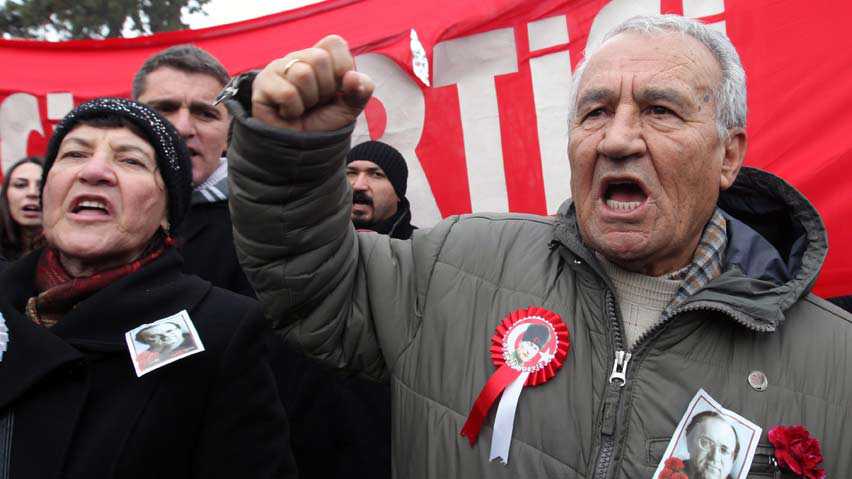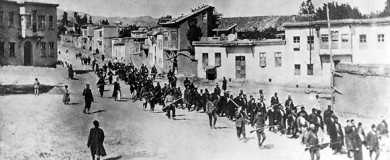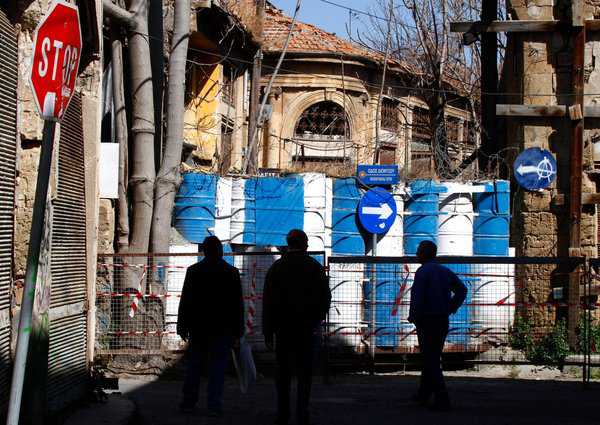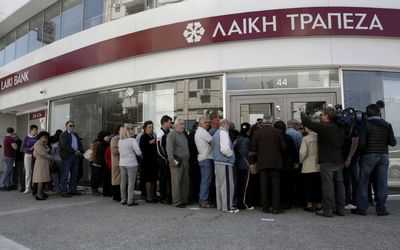Turkey’s ambassador to Canada says the Harper government’s decision to brand the killing of Armenians by Ottoman Turks as genocide may be hindering a potentially lucrative trading relationship.

Turks demonstrate outside the French Embassy in Ankara in January 2012. Relations between Turkey and France turned cold when a bill was passed making illegal to deny the Armenian genocide. The bill was later ruled unconstitutional. (Burhan Ozbilici/Canadian Press)
Ambassador Tuncay Babali made clear in a wide ranging interview with The Canadian Press that Canada’s position on the First World War-era slaughter of an estimated 1.5 million Armenians still carries a sting for his country.
‘[Genocide is] a serious allegation. It needs to be substantiated, legally, historically.’
—Turkish Ambassador Tuncay Babali
But that doesn’t mean Turkey doesn’t want to press on with forging a deeper economic relationship with Canada, ideally a free trade agreement to complement the current Canada-EU free trade talks once they are completed, he said.
“I’m a true believer in the potential of our two nations. Canada has a lot to offer Turkey and Turkey in return has a lot to offer Canada,” said Babali, noting that Canada’s internal Foreign Policy Plan has identified Turkey as a key country of focus.
“It cannot be business as usual while accusing a nation of genocide. It’s a serious allegation. It needs to be substantiated, legally, historically.”
Babali said he suspects Canada is not engaging as quickly as Turkey would like because the genocide issue is still hanging over relations.
“There is a pacing issue here,” he said. “We want results. We want action. We want concrete steps forward. Talking about positive things is OK, but it takes two to tango.”
The $2.5 billion in two-way trade between countries “is far from the potential” of what Turkey predicts would result from deeper economic ties: $10 billion to $15 billion within five years, he said.
He said Turkey would like to open free trade talks with Canada.
Mending fences
But on the genocide question, Babali said Turkey would like to see a gesture from Canada that the government is “trying to leave this behind us.”
Foreign Affairs Minister John Baird cancelled a planned trip to Turkey in November. (Sean Kilpatrick/Canadian Press)
A significant gesture would be a “high level” visit by Foreign Affairs Minister John Baird to Turkey. Baird cancelled a planned trip in November, Babali said, because of an important cabinet meeting in Ottawa.
Babali was also encourged by Baird’s plans to travel to the West Bank on the weekend to discuss future Canadian aid contributions to the Palestinian Authority.
He suggested Canada can do more in the Middle East peace process, even though Turkey is well aware of Ottawa’s strong support of Israel.
“I think aid is important. To keep the channels open. You have to hear both sides. Canada has leverage that can play in those issues as well. It should be used in a stronger way.”
Babali praised the efforts of Baird for mending fences with Turkey, including the personal friendship he has forged with his counterpart, Ahmet Davutolu, who visited Canada this past September.
“If there is a political will from the Canadian side to move forward and improve our relations further, to live up to the promise and potential, we need concrete steps,” he said
Ankara angered
Canada’s Parliament voted in 2004 to recognize the events of 1915 to 1923 as a genocide carried out by Ottoman Turks during the Armenian uprising.
The Harper government formally adopted that position after winning power, a decision that angered Ankara and sparked the temporary withdrawal of its ambassador from Ottawa.
Turkey has lobbied hard internationally to block the genocide designation, although many other countries have used the term.
In 2010, when the U.S. Congress abandoned a plan to declare the killings a genocide, Davutolu said ties could have been harmed between the two countries had “common sense” not prevailed.
Last year, when France passed a law that would make it a crime to deny the Armenian genocide, Turkey responded by suspending military, economic and political ties. The French bill was later ruled unconstitutional.
Ottawa last year unveiled a monument in honour of fallen Turkish diplomat Col. Atilla Altikat, who was assassinated in 1982. (Fred Chartrand/Canadian Press)
Last summer, Canada took steps to heal the rift with Turkey. It unveiled a cone-shaped metal-and-wood monument dedicated to Col. Atilla Altikat, the country’s military attache gunned down in Ottawa, allegedly by Armenian terrorists, 30 years earlier.
That appeared to go a long way toward bridging the gap between the two countries, both NATO allies.
Babali reiterated what Davutolu said during his visit — that Turkey would like to strike a joint commission with Armenians to discuss the historical facts surrounding the issue.
During the visit, Baird did not back away from his government’s earlier position, but said he appreciated the sensitivities at play.
Babali said Turkey wants deeper economic ties with Canada, and it appears the country is open for business despite any bitterness over the Armenia policy.
In the next 10 years, Turkey will launch 150 infrastructure projects worth hundreds of billions of dollars, many in the transportation sector. Babali cited Bombardier Inc. and SNC-Lavalin as potential investors.
He also said there are also opportunities for Canadian companies in his country’s developing nuclear energy program and in shale gas exploration.
via Turkey wants end to Canada’s genocide stance – World – CBC News.





